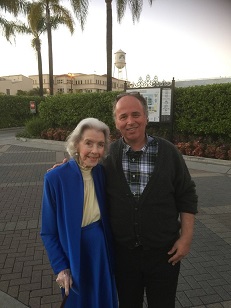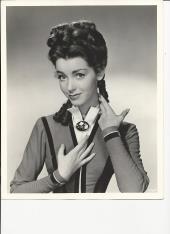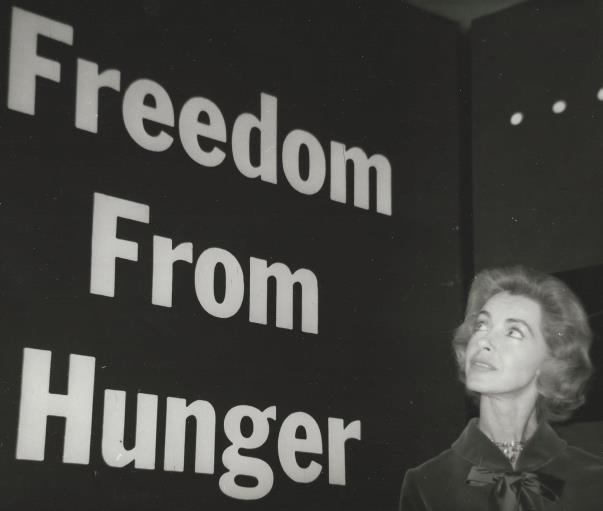Marsha Hunt, Dalton Trumbo and The Blacklist
Posted by Leah on
1/7/2016 8:28:04 AM
Prefer to listen rather than read? Listen Here!
Article originally posted on http://filmdebate.co.uk/
The time of the Blacklist was a scary one in Hollywood; a time whose influences can still be felt today. Until recently I didn’t know that much about it. I had seen some of the old news clips, and basically knew that it had something to do with Communism, but that’s about the extent of my knowledge on the subject. Then, in October 2015, I had the pleasure of meeting Roger Memos. He asked that I come and see his documentary Marsha Hunt’s Sweet Adversity. I agreed, not knowing much about the film, or its subject.

Marsha Hunt and Roger Memos (Photo courtesy of Roger Memos
I learned from the film that Marsha Hunt was a prominent actress from 1939-1945. During that time she appeared in 52 films, often as the romantic lead. Then, in 1950, her name was added to the ever growing Blacklist, thus putting a halt to her film career.
This enticed me. I had to find out more about the Blacklist and its scope. After seeing his film, I had the pleasure of speaking more with Mr. Memos. He mentioned to me that there was another film that was to be released about the Blacklist. The film was Trumbo. Mr. Memos told me that although Marsha Hunt and Dalton Trumbo didn’t personally know each other, they had met, and that Hunt had even acted in one of Trumbo’s films. I knew then that as soon as Trumbo was released that I had to see it.
After seeing Trumbo there was one thing that I found truly striking. Although Dalton Trumbo and Marsha Hunt were both Blacklisted, their stories couldn’t be more different. The ways in which each of them handled their Blacklisting and tried to move on with their lives are like night and day. But before I get into all of that, I think a little bit of backstory on the Blacklist is due.
In 1938 the House Committee on Un-American Activities, or HUAC, released a report claiming that Communism and Communist propaganda were running rampant in Hollywood. At that time the committee didn’t get very far, since America became allies with Communist Russia during WWII.
Then, in 1945, with the start of the Cold War, sentiments changed for the worse, and HUAC saw their opportunity. One of the members of HUAC, Mississippi congressman John E. Rankin, said in a press conference, “One of the most dangerous plots ever instigated for the overthrow of this Government has its headquarters in Hollywood ... the greatest hotbed of subversive activities in the United States.”
Although it took another two years, by 1947 HUAC gained the support and momentum they needed. In October of that year they began the now infamous hearings, in which “members” of Hollywood were subpoenaed to testify and name people as members of the Communist Party, or as Communist sympathizers. As the years and the hearings went on, a number of other organizations came out with their own versions of the Blacklist. The “original” list, from HUAC, named 23 people. The American Legion came out with its own list in 1949, adding 128 people who it claimed were participants in the “Communist Conspiracy”. In 1950 the weekly newsletter Counterattack released a pamphlet called Red Channels, in which 151 people were named. That meant, on the “official” lists, there were over 300 people blacklisted (a full list of all who were Blacklisted can be found here, if you scroll down to almost the bottom of the page: https://en.wikipedia.org/wiki/Hollywood_blacklist).
No matter how many friends you had, or how much power and influence you wielded, being on the Blacklist was not an easy thing. It meant that, whatever your work may be, (acting, writing, music, directing, etc) no one would hire you and people who were once your friends and associates would now shun and avoid you. It essentially meant that your career in Hollywood was over.
Which brings me back to Trumbo and Hunt. Dalton Trumbo was put on the Blacklist as one of the Hollywood Ten. These ten people went before HUAC in 1947 and refused to answer the committee’s questions about their beliefs and affiliations. They also refused to name names and continuously cited the First Amendment. These ten people were cited for contempt of Congress and were sentenced to six months to one year in prison, as well as a $1000 fine.
Marsha Hunt and her husband Robert Presnell, in 1947, saw what HUAC was doing to their friends and loved ones and decided to join the Committee for the First Amendment. Other members of the committee included Lauren Bacall, Humphrey Bogart, Danny Kaye and John Huston, among others. In October of 1947 Hunt, Presnell and 30 other members of the Committee for the First Amendment flew to Washington, DC to protest the HUAC proceedings. By the time Hunt returned to Hollywood three days later, the Red Channels publication had been released with her name on it and she was barred from working.

Marsha Hunt in costume for the 1945 film Valley of Decision (Photo courtesy of Roger Memos
While Marsha Hunt has appeared in Broadway plays, TV shows and several movies since her Blacklisting, the roles came slowly and were few and far between. She instead focused her attentions on more humanitarian efforts and for over 3 decades she has served on boards dedicated to the United Nations Specialized Agencies, hunger, fair housing, community relations, youth, cerebral palsy, family planning, mental health and interfaith harmony. In addition she wrote a book, The Way We Wore: Styles of the 1930s and '40s and Our World Since Then and has worked on her music, coming out with the CD Tony London: Songs From The Heart with the Page Cavanaugh Trio which features two of the over fifty songs that’s she’s composed. She was also named Honorary Mayor of Sherman Oaks, CA, where she founded the San Fernando Valley Mayor's Fund for the Homeless and Rose Cottage, a daycare center for homeless children. At the age of 98 she shows no signs of slowing down her charitable work and continues to travel the country giving speeches about her many causes.

Marsha Hunt in front of a sign for the charity Freedom From Hunger (Photo courtsey of Roger Memos)
Dalton Trumbo, on the other hand, fought his Blacklisting fiercely. By 1947, when he and the rest of the Hollywood Ten went before the HUAC Committee, Trumbo had already written or been somehow involved with 37 titles. After his prison sentence was finished, he returned home to find his family in financial ruin. In order to stay afloat Trumbo then sold his California ranch and moved, with his family, to Mexico City to live with fellow Blacklisters Hugo Butler and his wife Jean Rouverol.
From 1949 to 1960 Trumbo wrote an unknown number of titles, but couldn’t put his name on any of them due to his Blacklisting. Instead, Trumbo used a variety of pseudonyms and the names of friends who weren’t on the list in order to keep working.
The removal of Dalton Trumbo’s name from the Blacklist is credited to Kirk Douglass and Otto Preminger. Both men came to Trumbo, despite his Blacklisting, to revamp the scripts for Spartacus and Exodus respectively. After gaining the support of these Hollywood elite, Trumbo was cleared from the list and was then able to claim credit for his work again. He continued to write until his death in 1976.
It wasn’t until 1975 that Trumbo was officially awarded the Oscar he’d won for the screenplay of The Brave One in 1956. In 1993 he was posthumously awarded the Oscar for the screenplay of Roman Holiday, which had previously been given to Ian McLellan Hunter because he fronted for Trumbo. To this day the full scope of Dalton Trumbo’s work is unknown, since he was forced to use pseudonyms for so many years.
With over 300 names on the Blacklist at its peak, I’m sure there are countless other stories of hardship and heartbreak. The people on the list did nothing wrong and their career demise can be contributed to nothing more than needless hysteria perpetuated by a fear of different mindsets. The personal stories of Dalton Trumbo and Marsha Hunt may have taken different paths, but the point remains the same. We cannot let this happen ever again! I suggest that you all take the time to see both Marsha Hunt’s Sweet Adversity and Trumbo, because the only way to ensure the past doesn’t repeat itself is to know what happened!
More information about Marsha Hunt’s Sweet Adversity can be found here: https://www.facebook.com/marshahuntdoc. Trumbo can still be seen in theaters and has no at home release date as of yet.